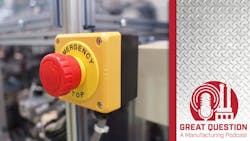Podcast: Why everyone on the plant floor is drawn to a dumpster fire
Joe Kuhn, CMRP, former plant manager, engineer, and global reliability consultant, is now president of Lean Driven Reliability LLC. He is the author of the book “Zero to Hero: How to Jumpstart Your Reliability Journey Given Today’s Business Challenges” and the creator of the Joe Kuhn YouTube Channel, which offers content on starting your reliability journey and achieving financial independence. In our monthly podcast miniseries, Ask a Plant Manager, Joe considers a commonplace scenario facing the industry and offers his advice, as well as actions that you can take to get on track tomorrow. This episode offers insight into how to stop nurturing the emergency maintenance/dumpster fire culture.
Below is the transcript of the podcast:
PS: So the last column you wrote for us, Joe, it was a great one; they all are. And by the way, if you have not read Joe Kuhn’s column Leadership in Action, be sure to check that out at plantservices.com. This last column was in part about how to move from reactive maintenance to planned maintenance, and you gave very good step-by-step advice on how to do that. Today, for this podcast, I wanted to hone in on one very interesting point that you make in this article.
Obviously, it takes a very great effort, and a lot of planning to move from reactive maintenance. But often, it's also about a culture change from top to bottom and moving away from one that celebrates the emergency culture. And it's not just the technicians and those on the plant floor that are drawn to emergencies. You point out that top executives, managers, supervisors are often all drawn to the drama of emergency culture, like moths to a flame, you said.
So, then, the hero on the white horse emerges from the front office down to the plant floor to save the day. And then the next day, that last minute hero is publicly recognized for their hard work, creativity, and unwillingness to accept failure. So, phew, disaster averted, right? Or was it? Maybe instead, they're reinforcing that emergency culture by regularly rewarding those last minute saves? So, Joe, how do we flip that coin? First off, why are plant cultures drawn to the dumpster fire that is emergency work? How do plants do the reactive emergency work that they need to do, but perhaps do less celebrating of it? And ultimately, why are plants not celebrating reliability and maintenance heroes more? And how do we do that?
JK: Yeah, there's a whole lot in there, Anna, and I think I can shed some light on it from experiences I've had. And hopefully this will resonate, and maybe come up with a couple actions that people can implement.
Why? First of all, imagine going to a movie, and nothing happens in the movie, no drama, no excitement, no airplane crash, you wouldn't go see the movie. I mean, that's why we like superheroes. I think humans are drawn to that. Look at the news media. If it bleeds, it leads, right? I mean, if you watch 24-hour news, you'll jump off a cliff. Everything's bad. Everybody is naturally drawn to that, I think it's the way we evolved a little bit, over 100,000, 200,000 years, so it's just natural.
But as a leader, you’ve got to recognize that there's going to be this natural urge in that direction, and I'll talk about that in a second, what you do to first is recognize it, and then implement something to counteract that. Another thing with managers and you won't get too many other managers state this, and plant managers, but it's true. In my job, when I was a plant manager, I went to a lot of meetings, and a lot of people issues, a lot of bureaucracy, a lot of corporate directive type stuff. When there's a dumpster fire, hey, that's why I became an engineer, I'm going to put my engineer hat on, and I'm going to go out and do what I love doing, 20 years ago, 15 years ago, it's exciting. And it's something that, I think I can offer something and you'll see that so often in plants is they say hey, ‘I'm going to go down three jobs ago and do something that I love doing, and I was pretty good at it.’ And that's probably why you got promoted. They like using those skills, and that's just two big pieces of gravity, all sides sucking people to that dumpster fire as you say.
Now, what can you do about it? And there are a couple points that I like sharing, and I think I put several of these in the paper I wrote, but the first thing you've got to understand, and I mean, really explicitly understand is the only way that you're going to get out of doing more emergency work is by doing planned work. So if you only get the emergency work done, say you've got 100 emergency jobs this week, just to throw out a number. If you don't do any planned work, you're going to have 110 next week, you're going to have 120 the next week. You're going to continue, and this dumpster fire is going to be a black hole that you just get sucked into. So you’ve got to recognize, okay, once we get out of this dumpster, this particular dumpster fire, we’ve got to recognize that we have to do more planned work.
So what I highly encourage people to do lock yourself in a room and figure out, how are you going to organize, recognizing that you’ve got to do emergency work. Number one, it's just reality; it's going to happen. And number two, how you going to do more planned work? So, for example, say you have five mechanics on day shift, I'll just talk about mechanics, for some reason I like picking on mechanics, maybe my mechanical engineering background, but you’ve got five mechanics on day shift. And then you give them all planned work today. But at the end of the day, all they did was emergency work, because they got called off to do this, that and the other thing. That's what happens. It’s 100% reactive plants. Their intention is to do planned work, and then they do nothing at the end of the day. And they hope tomorrow is better and it never is. That's most people's current state.
So if you have these five mechanics, what I would like for you to try as a 90-day experiment, I like wording it as an experiment. That tells people that you're willing to look at other options. Take one of those mechanics and have them do planned work, and have the other four do emergency work. Okay, now the four doing emergency work, you're going to have to prioritize assets. You should be thinking about asset criticality, not every asset is the same, or has the same level of importance as the others. So you have those people work through the emergency work, just like if one person was on vacation or on medical leave, you'd figure it out and protect the one person do unplanned work. And when I say protect them, have a requirement that you have to call the plant manager to get approval to pull that person off planned work. Guess what, no phone calls. Wherever it happens, they'll come up with other ways of doing it. So you have that one person doing planned work. And that planned work is actually strategically implemented, maybe that's not the right word, you focus. It’s strategically focused. What are our top issues at this plant? Maybe it's lubrication. Maybe it's the condition of your belts and shivs and pulleys and chains and all that kind of stuff. You focus on those PMs, and we said, ‘hey, we're not going to worry about getting 90% PM compliance. This month, we're going to get 90% lube compliance this month, or 90% belt and shiv and pulley and chain compliance this month. You focus, okay, here's what will happen in 30, 60, or even, 90 days. You're going to start to get that amount of emergency work, it's going to start to go down. I've seen it 100% of time. It'll go down. So say you were back at that 100 emergency jobs a week that may dive down to 90 and then 85 and then 70. Then, you may add a second person. My point is you’ve got to organize, recognizing the natural pull towards emergency work. So you got organized around it. In this example, I did one to four, four doing emergency and one doing planned work. It starts there and then over time you change those numbers around. Maybe six months later you can make it three and two or something like that. But you got to organize for separating crews is the best thing I've seen work.
Also, recognizing most people have a morning meeting, eight o'clock the next morning, we'll talk about what happened yesterday, what's kind of going on today. We could do better job in that morning meeting and that may be another video call for us. But recognize at least two to one that the people that are doing proactive work, yes, we want to recognize the person that ‘We had this pump fail and we didn't have a spare and they pull it off they were able to cobbled together the existing pump with some spare parts that they found around the plant and we thought we're going to be down for two days and we ended up being down for hours. Great job you’re a hero, you’re hero. Okay, great.’
But also what about yesterday, ‘We got 100% of our PMs done. We've tried to get five PMs done. We got them all done. Okay, we're at 90% PM compliance for the month. The number of emergency calls that we're having per week is going down by 5% so far this month. Recognize all those actions that are preventing tomorrow's disasters. It could be if you got a PdM team, a condition monitoring team, we did 100% of our routes last week. We have 12 routes with IR, we have 7 with vibration, and we have two with UE. Okay, we completed 100% of them.’ Recognize those people, the reliability people know, when you sit them in a classroom or conference room, everybody knows that, you've got to do the planned work. But in the drama of a planet, you get drawn to the dumpster fire, I like those words dumpster fire. But that leader has to step out and say, ‘Gosh, I know I love the guys yesterday. I was really worried about calling the vice president and telling him we were going to be out for two days, and you just saved me. Yes, thank you. Also thank the person that prevented next week's two days of downtime, next month's four days of downtime, you've got to recognize those.
And it comes, I’ll circle back to the very first truth. The only way out of this drama is by doing planned work. Are you organized to get planned work done? Now, here's what happens at a lot of plants. They say, ‘Hey, Anna, and Joe, here's a plan work for you to do tomorrow. It's two hours for two people, but I'm going to plan it two hours for eight people, because I know you're going to get pulled off. You're going to get pulled off onto some emergency work. Well, what happens the end of the day? We do 5% of the planned work. We do half the lubrication we're supposed to do, but we got all the emergency done. And at the end of the day, we just closed down all the work orders, call it all planned work, and we put a checkbox on ‘Hey, we did all that maintenance.’
This is what happens at a lot of plants is they think they're doing the PMs and they're not. And they're inflating the hours associated with those PMs. So as a leader summarize and recognize two to one, the planned work. Connect the dots for people. ‘Did anybody notice that we only had one pump failure last month? That's because we've been doing a better job of our lubrication and our precision maintenance around alignment. We're doing alignment on every motor pump setup. We've got a packing expert, and we're doing all the lubrication. Did anybody notice we only had one? Our average the last two years has been 10. We had one. You connect the dots as a leader. Recognize the people that are doing that work, yeah, the heroes. That to me are the real maintenance heroes are the ones that prevent drama. Yes, there are people that you need that respond to drama, and dumpster fires, you need those folks. But two to one celebrate the preventers.
PS: That was a lot to think about and a couple points I want to make. Obviously, it all comes back to making time for that planned work. And I love your point about, if you want to pull someone off that planned work, you got to call the plant manager and that won't happen. So they'll find other ways around it. And as that leader, it's important to connect the dots for people and make sure that you're not inflating those PM KPIs.
One last point I want to make. In some ways, I think maintenance and reliability simply has a PR problem. How do you celebrate that motor that doesn't break because you've done great maintenance on it or all the problems you catch before they happen because of your good practices? In these teams that are so busy trying to do all that planned work, how do you stop and champion what you did yesterday? It's not easy. And as always I think you've given a lot of great advice on how to move away from celebrating that emergency culture and moving towards celebrating our reliability heroes. And it may just improve your overall maintenance at the same time with that culture shift.
JK: Absolutely. I've seen it 100% of the time improve the culture. But it starts with the leadership, starts with the leadership. They set the tone. They set the culture. What they recognize publicly and privately that that can change your culture seriously one experience at a time.
About the Podcast
Great Question: A Manufacturing Podcast offers news and information for the people who make, store and move things and those who manage and maintain the facilities where that work gets done. Manufacturers from chemical producers to automakers to machine shops can listen for critical insights into the technologies, economic conditions and best practices that can influence how to best run facilities to reach operational excellence.
Listen to another episode and subscribe on your favorite podcast app
About the Author
Joe Kuhn
CMRP
Joe Kuhn, CMRP, former plant manager, engineer, and global reliability consultant, is now president of Lean Driven Reliability LLC. He is the author of the book “Zero to Hero: How to Jumpstart Your Reliability Journey Given Today’s Business Challenges” and the creator of the Joe Kuhn YouTube Channel, which offers content on creating a reliability culture as well as financial independence to help you retire early. Contact Joe Kuhn at [email protected].

Anna Townshend
managing editor
Anna Townshend has been a journalist and editor for almost 20 years. She joined Control Design and Plant Services as managing editor in June 2020. Previously, for more than 10 years, she was the editor of Marina Dock Age and International Dredging Review. In addition to writing and editing thousands of articles in her career, she has been an active speaker on industry panels and presentations, as well as host for the Tool Belt and Control Intelligence podcasts. Email her at [email protected].

